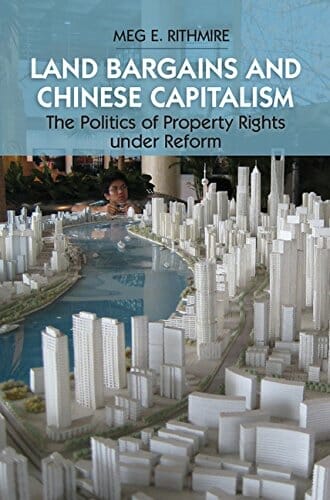Videos
Learn More About Meg Rithmire
As businesses become more interconnected, understanding China isn’t just a nice-to-have—it’s imperative for becoming a global player. Yet many organizations remain unaware of the effects China’s intricate economy has on trade today and are unprepared for the impact it will have on the future.
“You need a theory on China,” asserts award-winning Harvard Business School professor Meg Rithmire. “Whether you’re a financial services group that only passively invests in China, or if you’re a university that engages Chinese students, or if you’re manufacturing anything from cat food to quantum chips – if you want to be successful, you need to have a theory of where China comes from, where it’s going and how people in the party-state think.”
A leading expert on the reform and expansion of Chinese capitalism and its interaction with the rest of the world, Rithmire offers leaders vital knowledge about the multifaceted intertwining of politics, the economy and international affairs in the global market. Using a variety of sources, including survey data and quotes from notable people, Rithmire examines what misconceptions China and the U.S. have about the other, the “unmovable” parts of the relationship and the things that can be changed, and reveals what part leaders can play in it. Fluent in Mandarin, Rithmire holds seats on the editorial boards at China Quarterly and the China Journal. Her work contextualizes her projections of where China will be in 10 years, its interactions with other critical regions including the Middle East, India and Pakistan, and the potential paths this power player may take.
Rithmire’s profound understanding of China’s state-powered economic system equips businesses with the necessary context to navigate the changing landscapes of international commerce.
A Fresh Look at a Complex Global Dance
Winner of the 2015 and 2023 Faculty Teaching Award at Harvard Business School, Rithmire makes the challenges and opportunities presented by ever-shifting policy changes feel exciting and fresh. She brings practical solutions that empower leaders with confidence as they pilot regulatory transformations, helping them make informed strategic decisions that improve their agility in the global trade arena.
Author of several books, Rithmire delves further into the political-business dynamics of rapidly developing Asian economies in her most recent book, “Precarious Ties: Business and the State in Authoritarian Asia” (Oxford University Press, September 2023). In this essential overview, she examines the evolution of these ties in Indonesia, Malaysia and China, presenting invaluable insights for businesses operating in or with these regions. A must-read for anyone performing on this stage, she vividly illustrates that when working with these countries, success goes beyond understanding just economics – it’s about the complex interplay of power and policy.
Understanding the Nuances of China’s Economic Framework
“The future of U.S. and Chinese competition isn’t just about GDP numbers or trade wars. It’s about grasping the subtleties of its history, governance and aspirations,” Rithmire explains.
Visibly propelled by a relentless passion for China, its people and its past, she ventures under the hood of its operations, focusing keenly on the pivotal role of local governments and their cascading effects on global economics. Leaders under her guidance not only comprehend China’s economic maneuvers but develop a strategic worldview that enables them to approach an uncertain future with calmness and clarity.
More than a China expert, Rithmire offers leaders a bridge between misconceptions and clarity and between hesitation and informed decision-making. With her guidance, leaders don’t just learn about China – they learn how to think about China. As global economies become more intertwined and the relationship between China and the rest of the world continues to evolve, Rithmire’s direction isn’t just beneficial – it’s indispensable.
Meg Rithmire is the F. Warren MacFarlan associate professor in the Business, Government and International Economy Unit. She holds a Ph.D. in government from Harvard University, and her primary expertise is in the comparative political economy of development with a focus on China and Asia.
Her first book, “Land Bargains and Chinese Capitalism” (Cambridge University Press, 2015), examines the role of land politics, real estate and public finance in the Chinese economic reforms. Her new book, “Precarious Ties: Business and the State in Authoritarian Asia,” (Oxford University Press, September 2023), investigates the relationship between capital, the state and globalization in Asia, comparing China, Malaysia and Indonesia from the early 1980s to the present. The book further examines how governments attempt to discipline business and, second, how business adapts to different methods of state control. Her work also focuses on China’s role in the world, including Chinese outward investment and lending practices and economic relations between China and other countries, especially the U.S.
Rithmire is a faculty associate at the Weatherhead Center for International Affairs, the Fairbank Center for East Asian Studies at Harvard and the Harvard Faculty Committee on Southeast Asia. In 2022, she joined the editorial board of The China Quarterly. In 2015 and 2023, she won the Faculty Teaching Award in the Required Curriculum.
Meg Rithmire is available to advise your organization via virtual and in-person consulting meetings, interactive workshops and customized keynotes through the exclusive representation of Stern Speakers & Advisors, a division of Stern Strategy Group®.
Charting the Future of US-China Relations
Global economic dynamics are balancing on the future of U.S.-China relations. As China pivots from an explosive growth-centric strategy to one underpinned by national security, Harvard Business School professor Meg Rithmire offers leaders a profound grasp on China’s historical trajectory and current economic disposition to shed light on this increasingly complex landscape. Rithmire equips organizations with a deep understanding of China’s past, its present maneuvers and projections for the coming decade. She not only clarifies China’s economic and political ethos but also highlights the opportunities and implications for U.S.-China economic interactions. As competition intensifies, Rithmire’s historically informed perspective helps business leaders anticipate shifts, comprehend complex policies, and strategically navigate the intricate dance of the U.S.-China economic relationship.
Precarious Ties: Navigating State-Business Relations in Authoritarian Asia
The complex relationship between politics and business in developing Asian nations often takes center stage in the global economy. Harvard Business School professor Meg Rithmire, in her pivotal new book “Precarious Ties,” provides a riveting exploration of this relationship, showcasing the rapid economic growth seen under several enduring authoritarian regimes. By delving into three poignant case studies – Indonesia under Suharto, Malaysia under the Barisan Nasional, and China under the Communist Party – Rithmire unveils how alliances between autocrats and capitalists evolved over time and how it has led to diverse economic outcomes. With razor-sharp precision, she introduces two conceptual models of mutual alignment and mutual endangerment and explains how each either spurs or threatens growth. Rithmire’s insights illuminate the uncertain balance of power in these nations, offering captivating discourse as a guidepost for leaders seeking to comprehend the link between political might and economic vigor in Asian countries.
Craft a Theory on China to Be a Future-Ready Business
As the world economy continuously shifts, China remains a consistent focal point of attention, influence and change. Regardless of the industry, today’s organizations must understand and anticipate the vast ripple effects generated by China’s economic and policy decisions. Helping leaders become more future-ready is award-winning Harvard Business School professor Meg Rithmire. With an assertion that every global organization needs a “theory on China,” she brings an in-depth understanding of China’s intricate economic landscape and its impact on global trade. Drawing from her extensive knowledge – highlighted in her new book, “Precarious Ties: Business and the State in Authoritarian Asia,” Rithmire provides leaders with a comprehensive roadmap for understanding the nuances of global commerce. With her insights, business leaders will be equipped to devise effective plans of action for potential scenarios involving China, ensuring they remain prepared and adaptable to transformations in both supply and consumer bases.
Demystifying China: Dispelling Myths and Understanding the Realities
The modern narrative surrounding China’s global ambitions is riddled with misconceptions. Leveraging deep research and an analytical eye to dissect and debunk some of the most pervasive beliefs is Harvard Business School professor Meg Rithmire. Propelled by a persistent passion for China, its history and its people, she confidently dispels myths, like the notorious “Chinese debt trap,” an idea suggesting China strategically ensnares nations in unmanageable debt, ultimately seeking control over their pivotal assets. Rithmire unravels twisted narratives, citing comprehensive feasibility studies and historical fact to deliver a nuanced understanding of China’s actions and interactions on the world stage. This empowers leaders and organizations to approach the future with informed perspectives rather than misplaced apprehensions.

Precarious Ties: Business and the State in Authoritarian Asia
(Oxford University Press, September 2023)

High Stakes: A Framework for Geopolitical Risk Management
(U.S. Chamber of Commerce Foundation, April 2025)

U.S.-China Relations for the 2030s: Toward a Realistic Scenario for Coexistence
(Carnegie Endowment for International Peace, October 2024)

The State and Capitalism in China (Elements in Politics and Society in East Asia)
(Cambridge University Press, June 2023)

China's Party-State Capitalism and International Backlash: From Interdependence to Insecurity
(Harvard Kennedy School, Fall 2022)

Land Bargains and Chinese Capitalism: The Politics of Property Rights Under Reform
(Cambridge University Press; 1st edition, October 2015)
Harvard Business School professor and author of “Precarious Ties: Business and the State in Authoritarian Asia” (Oxford University Press, September 2023), Meg Rithmire, offers organizations, leaders and teams invaluable insights into China’s economic landscape. Leveraging her in-depth knowledge and position on the editorial board of China Quarterly, Rithmire crafts tailored advisory sessions for businesses eager to navigate China’s intricate political and economic realms. Whether virtually or in-person, her guidance transforms businesses’ understanding, enabling them to make informed decisions in a globally interconnected market. Topics covered include, but are not limited to:
- Crafting a Future-Ready Strategy on China: Understanding China’s influence and ripple effects on global trade.
- Deciphering the Dynamics of US-China Relations: Anticipating shifts and comprehending policies for strategic advantage.
- Demystifying China: Dissecting misconceptions and equipping businesses with a nuanced understanding of China’s global intentions and actions.
- State-Business Relations in Authoritarian Asia: Delving deep into the economic and political ties in countries like China, Indonesia and Malaysia, and understanding their implications for international business operations.
- Mastering the Play of Power, Policy, and Profit: A look into how understanding the intricacies of politics can give businesses an edge in their operations in or with Asian economies.
Praise for "Precarious Ties"
"In 'Precarious Ties', Rithmire delves into one of the most puzzling aspects of China's economic development: the unusually dangerous relationship between business and political elites in an authoritarian country."
"Meg Rithmire has brought finance into the study of Asian political economy with a vengeance. Her comparative analysis of three diverse authoritarian systems masterfully details how trust and alignment between business and the state tend to disintegrate over time, with politically explosive implications. Interested in what China's growing financial woes might mean for its politics? Read this book."
Praise for "Land Bargains and Chinese Capitalism"
"This bold, deeply researched study of how three northeastern cities in China disparately redefined the rights to and the usage of urban property to placate losers while facilitating economic reform is not just a model of the comparative method. Its insight about how the search for state legitimacy and the underwriting of what were really political deals with moral language is also a novel way of making sense of one facet of China's relentless commercialization. It will appeal to political economists and China scholars alike."
"Control of land is one of the fundamental challenges of economic development in China, and formal property rights are thought to be the sine qua non of economic growth. Yet, in this important new book Rithmire shows that property rights over land in China are anything but uniform, static, and predictable. Instead, she finds that property rights emerge as a particular bargain between local actors and social groups in a context of real uncertainty and regional experimentation. The book not only uncovers a critical aspect of how development really works in China, but it also significantly broadens our understanding of the institutional bases of economic growth and development."
"Rithmire's work tackles the most important socioeconomic-political phenomenon in contemporary China, urban transformation. She combines careful conceptualization and detailed case studies to explain patterns of urban changes that have impacted the lives of hundreds of millions of people. Through a mix of careful documentary research and in-depth interviews, Rithmire offers convincing and engrossing historical institutional accounts of urban transformation in some of China's most important cities. For any student of contemporary China, this is a must-read."
"As Meg Rithmire shows in this fascinating and remarkably well-researched book, an especially important yet utterly counterintuitive area in the political economy of Chinese development has been the problem of property rights, where, despite the fact that the state officially owns all land, enormous, vital, and innovative markets for its use have grown up all over the country. Rithmire's book lays out the historical peculiarity and broad political and economic significance of landed property governance in China's transformation since the 1980s. Her general argument for the whole of China is then contextually fleshed out with three detailed studies of property politics in the northern cities of Dalian, Harbin, and Changchun. Anyone wanting to understand the dynamics of growth in contemporary China, or, indeed, anyone interested in shaking up their deepest assumptions about what is possible in the development process, will benefit greatly by consulting this rich and informative book."
"… the book is based on superb research, makes excellent use of a wide array of local documentary sources, and is a textbook model of the comparative method. Land Bargains and Chinese Capitalism should be on the reading lists of scholars and graduate students who are interested in urbanizing China's political economy, and especially those focusing on the northeast."





























